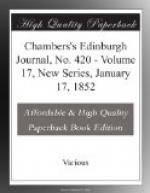Suffice it now to say, that the ‘Sisters of Mercy,’ the ‘Ursalines,’ the ‘Congregations of Notre Dame,’ the ‘English Ladies,’ and many others, are all in practice Sisters of Charity.
It is not uncommon to hear their condition deplored, as one from which all earthly enjoyments are excluded, or as a kind of death in life. But personal observation has given us different ideas on this subject. Within those lofty, and sometimes sullen-looking walls which enclose the convents of the sisterhoods we speak of, we have spent some of the most agreeable hours of our life, conversing with refined and enlightened women on the works of beneficence in which they were engaged; everything bearing an aspect of that cheerfulness and animation which only can be expected in places where worthy duties are well performed.
ADVENTURES OF AN ARMY PHYSICIAN.
Robert Jackson, the son of a small landed proprietor of limited income but respectable character in Lanarkshire, was born in 1750, at Stonebyres, in that county. He received his education first at the barony school of Wandon, and afterwards under the care of Mr Wilson, a teacher of considerable local celebrity at Crawford, one of the wildest spots in the Southern Highlands. He was subsequently apprenticed to Mr William Baillie, of Biggar; and in 1766 proceeded, for the completion of his professional training, to the university of Edinburgh, at that time illustrated and adorned by the genius and learning of such men as the Monros, the Cullens, and the Blacks.
In pursuing his studies at this favoured abode of science and literature, young Jackson is said to have evinced all that purity of morals and singleness of heart which characterised him in after-life, and to have resisted the allurements of dissipation by which, in those days especially, the youthful student was tempted to wander from the paths of virtuous industry. His circumstances were, however, distressingly narrow; and not only was he forced to forego the means of professional improvement open only to the more opulent student; but in order to meet the expenses of the winter-sessions, he was obliged to employ the summer, not in the study but in the practice of his profession. He engaged himself as medical officer to a Greenland whaler, and in two successive summers visited, in that capacity, ‘the thrilling regions of thick-ribbed ice;’ returning on each occasion with a recruited purse and a frame strengthened and invigorated by exposure and exercise. During these expeditions he occupied his leisure with the study of the Greek and Roman languages, and the careful and repeated perusal of the best authors in both.




